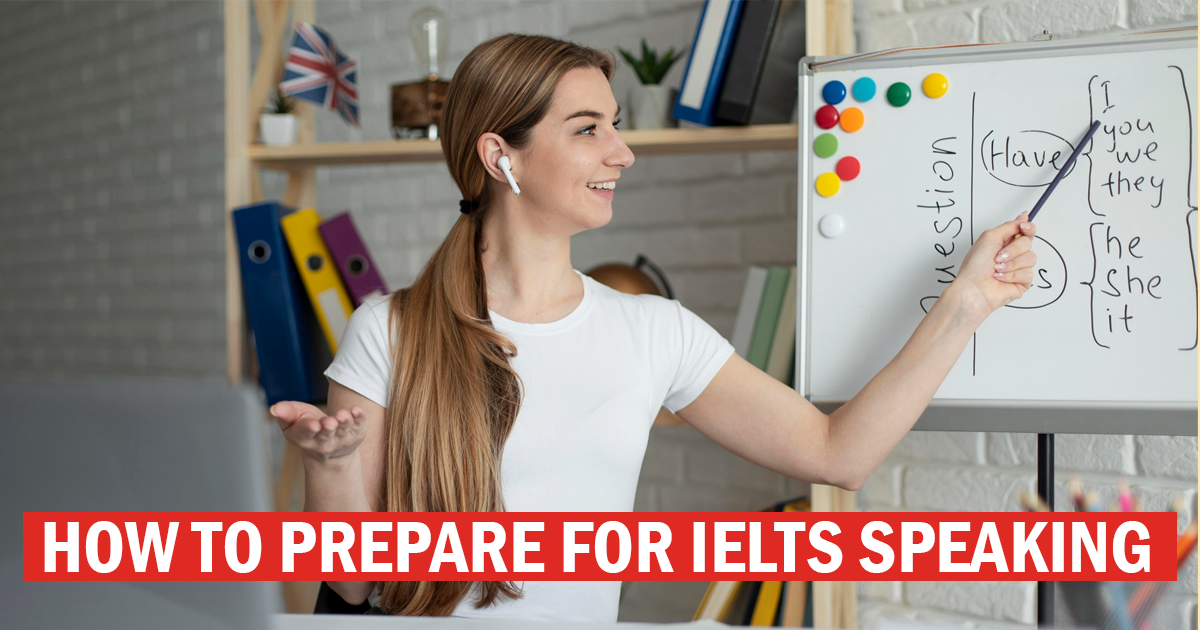IELTS (International English Language Testing System) is an English proficiency test that helps you relocate to a country where English is the native language. The basic philosophy behind the test is to help the examiners understand whether you will be able to work and communicate, in your daily life, in a country where English is the native language. The test has 4 tasks: Listening, Reading, Writing, and Speaking. Besides this, the IELTS test is of two types: Academic Test and General Training Test. The IELTS Academic Test is for those who wish to study, and the General Training test is for those who wish to apply for a PR or jobs. Based on your performance in either of the two, you will receive a score on a scale of 1-9.
The IELTS Speaking test checks your speaking ability and vocal clarity. It involves a one-to-one interaction between the student and an examiner. The IELTS Speaking section includes three parts, which give the examiner a chance to check the student’s range of different speaking skills. The IELTS Speaking section is recorded at the time of examination. IELTS speaking tips will help you improve your speaking fluency which will ultimately fetch you more scores. IELTS speaking includes the knowledge of grammar while using the English language. Avoid unfamiliar words and do not memorize the responses; rather you should be able to frame the sentences on your own.
Whether it is a paper-based or computer-delivered IELTS test, the face-to-face speaking test comprises three parts. First, understand what you will be asked in different parts of the speaking test, so, you can prepare following the test.
IELTS Speaking Pattern
In the speaking section, you are evaluated based on your pronunciation, fluency & coherence, grammar, and vocabulary.
The Speaking test is divided into 3 parts. The details of each part are mentioned below:
PART 1: Introduction and Interview
The examiner begins the test by introducing himself/herself, mentioning your candidate number, mentioning his/her examiner number, and checking your ID.
The examiner then asks for your introduction, your hobbies, some personal information, etc.
Questions then suddenly change directions and take the form of small talk. The idea behind this part is to judge a candidate’s ability to communicate on common topics of daily life. The number of questions in this part is not fixed and the duration of this part can be from 4 to 5 minutes.
PART 2: Individual Long Turn
The examiner will provide you with a Cue Card or a Task Card along with a few sheets of paper and a pencil. The task card will include a prompt, 3 dot points, and an additional sentence. The prompt is the topic on which you have to talk about. The 3 dot points are supposed to be covered in your talk. And the additional sentence is a follow-up question related to that topic.
You will be given 1 minute to prepare your notes and then the examiner will ask you to talk for 1-2 minutes. Overall, this part lasts for 3-4 minutes and is designed to test your skills and ability to speak on a particular topic. The examiner is trying to judge how coherently and you can organize your thoughts and ideas.
PART 3: Discussion
In this part of the examination, you will discuss with the examiner on the topic that was covered in Part 2. This will involve a back-and-forth conversation with the examiner. For instance, if you were asked about your travel experience in Part 2, the discussion in Part 3 might involve something on Tourism. This is more of an abstract discussion where you are judged on your ability to express your opinions, to explain a broader topic, etc. Part 3 usually lasts for about 4-5 minutes.
Here are some useful IELTS speaking tips for the candidates that will help you in preparing and score higher:
Do not use unfamiliar or big words
If you think that you can make a good impression by using complex words make sure to pronounce them correctly else it can backfire. These mistakes can affect your final band score. Work on your vocabulary and use words that you think can add value to the topic.
Practice common IELTS topics
You have to speak for 2 minutes on the given topic. You can practice some of the common topics with friends and family to improve your vocabulary with the topic.
Do not change your accent
In the speaking test, you should focus on communicating well and not on your way of speaking or your accent. However, make sure to use intonation and stress while speaking. Also, the examiner understands different accents, so, you need to just focus on communication.
Use grammatical structures
Try to use a range of grammatical structures while speaking. Practice speaking with your friends and family in English to spot your errors and improve them. You will be assessed on using different grammatical structures perfectly. So, make sure you use proper tenses.
Pause and think
If you want to take time to process questions then take your time. You can use phrases like ‘let me see’ and ‘It’s an interesting question’, so, you can get some time to think about the answer.
Extend your answers
Try to answer in detail! The examiner should not think that you cannot speak on a topic for long. Extend your answers before the examiner interrupts you. You should be able to speak on the topic extensively.
Avoid fillers
Avoid using fillers and speak confidently! Mostly, we use fillers when we do not have an idea what to say. Do not give examiners any idea that you are taking time and are not aware of what to say.
India’s largest online platform Yourpedia can play a very significant role in preparing candidates for IELTS. It offers a variety of resources and services that can help candidates improve their knowledge, skills, and bands in IELTS.




 yourpediaglobal@gmail.com
yourpediaglobal@gmail.com +91-9501773076
+91-9501773076




 Book a Free Session
Book a Free Session











